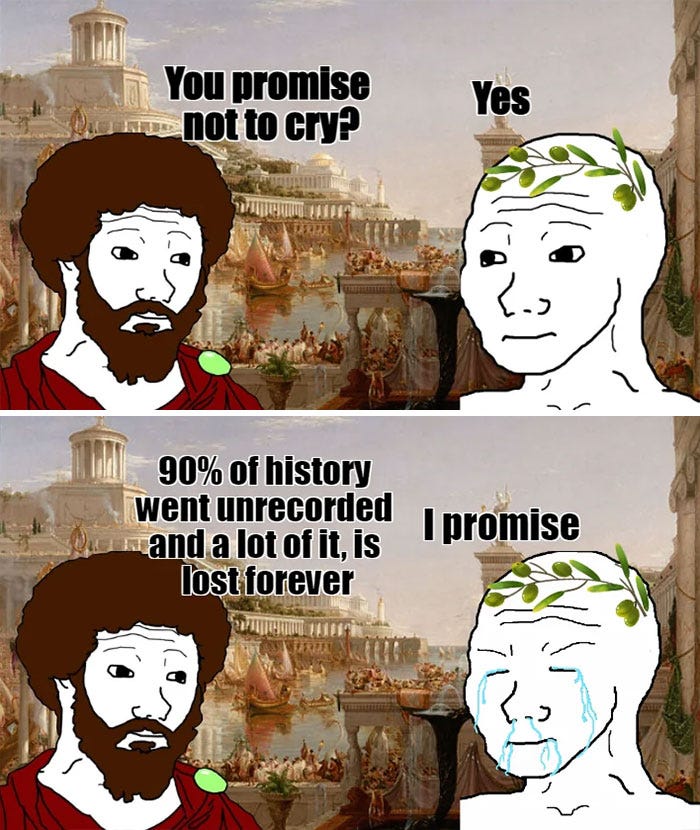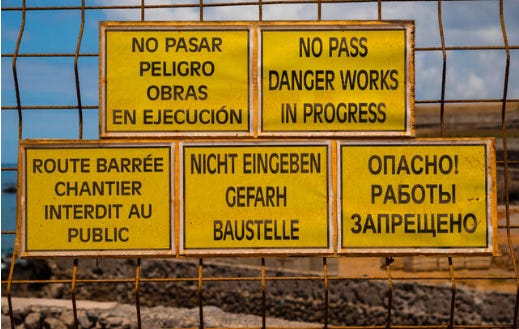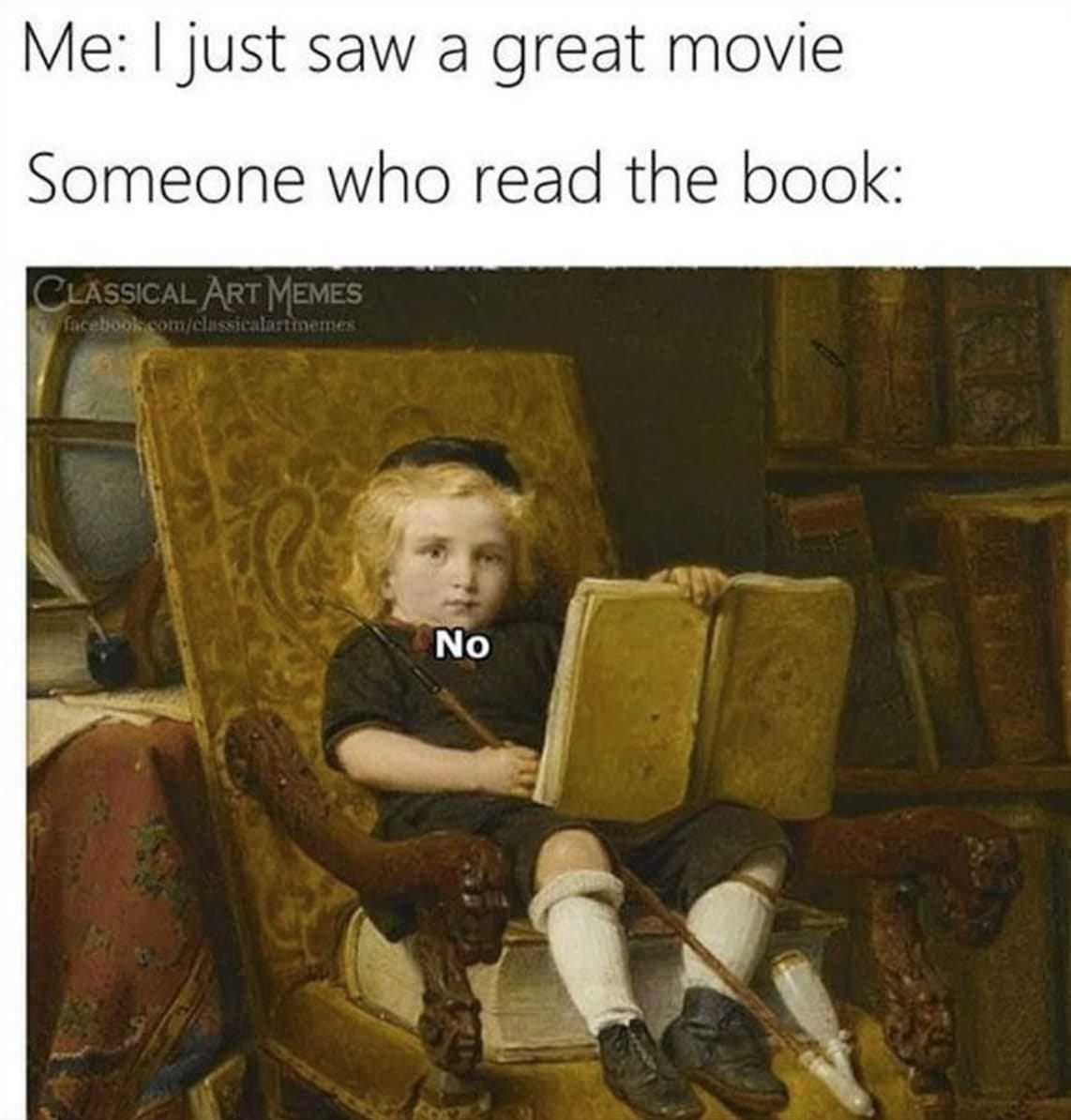Experiencing history
Seeing things through a new lens
Welcome, aspiring polyglot! History class was never a favorite of mine. Everything was seemingly so boring and I couldn’t really grasp why I was learning about these things that happened hundreds of years ago and thousands of miles away. Of course, the mind of a 15 year old is drastically different than that of an adult and so, now, I understand. One thing that helped me in that understanding was visiting places where history actually took place.
Americans certainly have a lot of history to learn within our own country, but visiting the battlegrounds, the graves, and the monuments from World War I and World War II changed my view completely. It is one thing to watch a movie, it is another thing entirely to see how many graves their are overlooking the Normandy beaches.
Fortunately, I was able to use this new found appreciation to bolster my historical understanding. With technology in its current state, you have even more options to do the same than I did at the time. Using these tools you will be able to expand not only your understanding of your target language, but your understanding of the world as a whole a well. If you have never heard someone’s story in the language in which it was told, you have only ever heard a retelling.
Learning through translations
If you have never heard history in the language where it happened, you might not actually know as much as you think. Living in Belgium I was shocked by how little I knew. Upon returning to the USA, I realized it is because everyone tells their story differently. This is one of the most intriguing parts of the Bastogne War Museum. In the exhibits you hear a neutral recounting of historical events from 3 different parties.
I always suggest going to museums if you can and choosing to have the tour in your target language. Even if you are an American, you can often opt for a Spanish or French or German tour instead of an English tour. If you ever played the game “telephone” in grade school you know why this is important. For those of you who have never played, it works like this:
The first person in the game writes something down. They then hide what they wrote, but repeat what they wrote into the ear of the person next to them. That person then repeats what they heard into the ear of the person next to them and so on until the last person hears what the first person said. The last person will then say aloud the final message that was relayed to them. Almost invariably this results in a complete change in the message that was written at the beginning.
All this to say, you should also be running your searches in your target language if you are reading about events that are taking place within a country that speaks your target language. Hearing what people’s interpretation (after all we must interpret to translate) of something is will always be worse than hearing, or reading, the words directly from the source. Learning to search for things in your target language quickly becomes a superpower for this exact reason.
Experiencing history rather than reading about it
Once you break free from the screen, though, I would encourage you to make visits to places of historical interest. It doesn’t really matter what you are interested in, there is a historical corollary to be found somewhere within a country that speaks your language of choice. It could be the trenches of WWI in Belgium, the castle where Martin Luther translated the Bible in Germany, or the Chichen Itza in Mexico.
Guided tours are amazing and, even if you can barely speak your target language, guides often go days or weeks without having engaged guests. You will be amazed at how partial the treatment you get is when you engage with your hosts, even in what you consider to be broken language. You can use this time to build confidence, practice new words, and ask questions directly to a native speaker. They may even give you some suggestions on where to go next.
You can really do this by visiting just about any historical site or monument. I have found that there are usually placards that have fun or historical facts scattered around various places. Oftentimes in multiple languages, especially in countries where English is not the primary language. For better or worse, you can usually find a side by side translation on these placards that you can use to test yourself. Work through as much as you can and use the translation to fill in blanks.
Using this method from home
From 2020-2022, one of the greatest technological jumps that was made was that of virtual tours. While not all museums offer digital tours, many do. This offers you the ability to experience places around the world from the comfort of your home. Of course, visiting is always the most enjoyable, but it is rarely the most possible. Filling up your study time by touring museums around the world is always enjoyable and offers you the chance to expand your horizons in several ways simultaneously.
Furthermore, you can use these to plan out real life trips that you eventually want to take. Nothing is worse than getting excited to see something only to find out that it is kind of underwhelming. By checking things out briefly ahead of time, you can properly set your expectations and get more out of every second you spend traveling the world. If you missed this article on doing this with art museums be sure to check it out:
The Most Underrated Tool for Learning foreign languages and Homeschool Options
Welcome, aspiring polyglot! With much of my content being aimed at targeting the public education system I want to take a minute to discuss how to empower people to learn a new language using methods that adapt to their individual learning styles. The reason I think this will be helpful for homeschooling is that each child's education will look differen…
The last reason you should be maximizing your world knowledge is because it will make learning any new language easier. I was reading a paper on transferring skills and something at the end really stuck out to me:
“While we make inferences constantly while reading, and while doing so clearly assists with comprehension, practicing strategies such as “making inferences” does not help much and there is no evidence that the ability to make inferences well transfers from one book to another. The opposite in fact…our ability to inference is a function of our prior knowledge…”
There are a few interpretations of this, but the one that matters to me and for you is that your inferences and your ability to make inferences is a function of your past experience. Consequently, the more you know about the world around you the easier it will be to make references. If you want to read the whole article, you can find it here: The Science of Reading
One of the reasons I suggest my students spend time furthering their knowledge in a domain they already have experience is because many terms will be shared between languages. This initial confidence boost is quite nice, especially when you are having to learn how to be bad at something again. Once you have built your confidence expand your horizons and take on some new challenges. The experience will pay off in ways you can hardly imagine.
Conclusion
If you are anything like me and you weren’t really big on history in school, I urge you to give it another shot. There is a historical event to correlate with just about any interest you might have. They may not all be in your target language, but you never know unless you search. Most of the time, if there is something covering an something in English, there will be something covering that same event, location, or time period in another language.
Make use of all the museum tours you can and seek out other opportunities for guided visits like monuments, memorials, and parks. It doesn’t take much to get on the good side of the tour guides and it is always an enjoyable way to get some comprehensible input practice. At first it will be difficult, but you can do difficult things and be great. So get out and do some difficult things and become great. I am rooting for you.
Requests
If you have anything you would like covered you can reach out to me on X, Instagram, or at odin@secondlanguagestrategies.com.
Additional Resources
Don't want to spend time playing catch up? Pick up the 3 Months to Conversational book now available on Amazon! 3 Months to Conversational
For more long form content be sure to check out the website and the FREE Language Learning PDFs we have available!
Subscribe for new content on YouTube and TikTok!
Learning Spanish? We have begun aggregating resources in you Spanish Resource Newsletter!
Don't forget to pick up your very own French Language Logbook or Spanish Language Logbook








